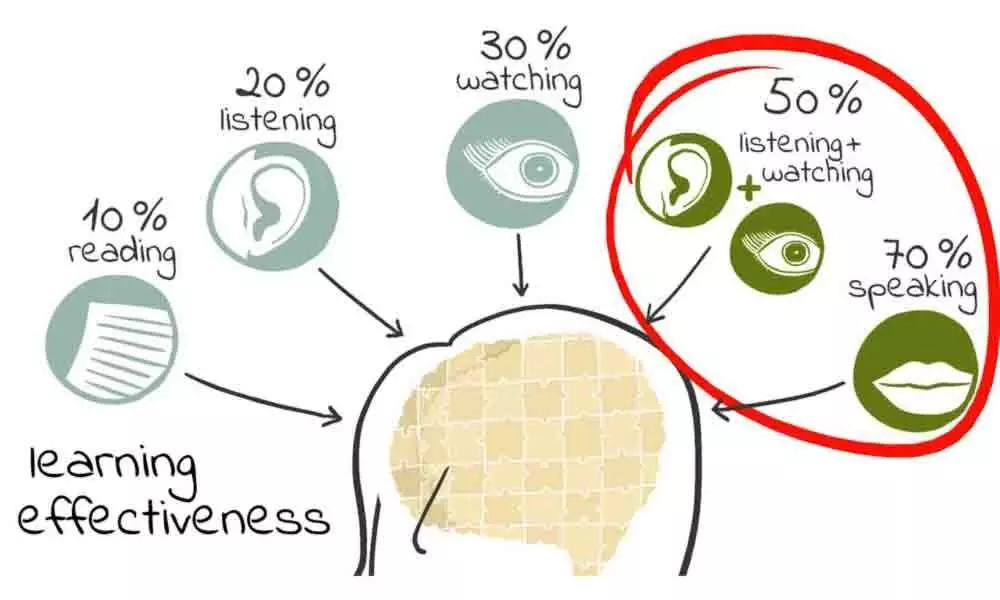What makes English language learning effective

A recent BBC survey says that merely ten percent of the total population in India is fluent in the English language. This is an alarming scenario for English is becoming a lingua franca rapidly across the world.
A recent BBC survey says that merely ten percent of the total population in India is fluent in the English language. This is an alarming scenario for English is becoming a lingua franca rapidly across the world. While many Asian countries like Vietnam and Indonesia are in the process of ensuring their student population becomes proficient in English, in India lack of adequate resources like capable teachers and better learning environments are detrimental to the growth of the same level of proficiency in students.
Although there is a strong and clear demand for English competency in urban and in rural areas in India, delivering English learning on the ground, however, is a challenge. It becomes all the more difficult when kids do not encounter situations where English language is used in their everyday environment and have to rely on acquiring the language skills during English periods of one- or two-hour sessions in their schools.
Let's discuss some of the reasons why children might not be learning English language skills as well as they should.
Language classes are often passive environments
Language learning often does not involve socio-physical activities in the classroom. Most students expect their teacher to deliver the language lesson and rely on written notes as a singular means to understand the workings of it. Like any other subject, even language learning needs some level of creativity and activity to make the learning process smoother and more enjoyable. Teachers can come up with new and interesting ways to teach concepts of grammar and pronunciation to students. Teachers can encourage classroom role plays, speaking tasks and use language labs like Sanako which help students learn the language via different reading and speaking activities in a digital lab making language learning an active and immersive experience for the students.
English is treated as a subject to be studied and not as several language skills to be acquired
English language learning is an acquisition of skills mainly the listening, speaking, reading, writing skills. In school, knowledge-based subjects such as Maths, Social Studies and Science are all approached in the same manner; as an assimilation of facts that needs to be absorbed to understand the subject. Since languages are learned within the same curriculum as these other subjects, students make the mistake of approaching English language in the same way as these subjects. If students remain unaware that a language is an amalgamation of skills that need to be acquired through practice, and instead study it like their other school subjects, it will result in a process of rote learning certain sentences and language structures. This will have a profoundly negative effect on their language learning for they will not be able to spontaneously use the language in unrehearsed situations. This will undermine their self-confidence, hamper their decision-making skills, and the actions they take along their learning path.
Focus on cooperation rather than competition
Modern school systems have been built around the theme of competition and getting good grades, while language learning ultimately is (and should be) a collaborative activity. For example, when kids are outside, they just play, interact with each other, smile, laugh, make mistakes and grow together. It transforms into a cumulative as well as a personal learning experience for them. Within those circumstances, learning literally thrives. We need to create a similar environment for them within the classroom so that children can actually learn the language skills through interactions and synergic activities without worrying about grades and assessment.
Encourage out-of-class participation with the language
Teachers should encourage students to learn the language on a daily basis, wherever and whenever they are free to do so. Since students always spend most of their lives outside the classroom, these external learning opportunities should become the primary focus of any language instructor. Once that shift is made, in-classroom time becomes 'supplementary learning time' as students can use time inside the classroom to ask the teacher for help or clarification on any language-related issues that they may have encountered outside the classroom.
Interesting and organized learning material matters
The material used to teach English, at least in the initial phases of language learning, plays a very crucial role in the child's eventual success. If learning material is monotonous and inefficient, it risks a negative impact even on the most eager learner/student with full intention of learning the language. Learning materials that are both well-organized, engaging and interesting to the learner work best for them. If the material is enjoyable but poorly organized, then the student will use it but not learn much. Conversely, if the material is well-organized but dull, the student will likely never bother to pick it up. Teachers and educators can use new-age educational tools like BBC Muzzy, which is so interesting that to make things interesting for children. Using captivating cartoon characters that tell a video story, Muzzy BBC uses a natural immersion approach to language learning that mimics the process we all used to acquire our native tongue.
As parents and teachers, it is our responsibility to ensure that our kids are future-ready and that means having knowledge and being proficient in a language like English that is a means of international communication and opportunity today.
















